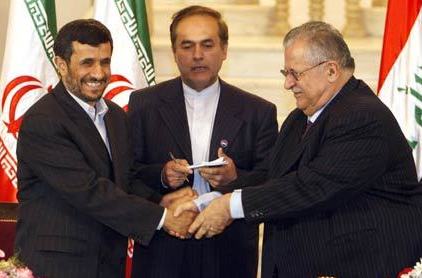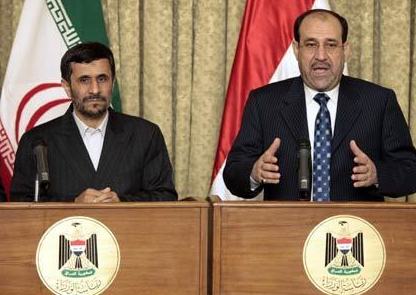Ahmadinejad ends visit, hails Iraq ties
Updated: 2008-03-04 10:34
BAGHDAD -- Iranian President Mahmoud Ahmadinejad on Monday wrapped up his two-day "historic" visit to Iraq, during which he hailed the brotherly ties with the former foe and lashed out at the United States.
The visit is part of the campaign of the Iranian president to scuttle the US attempt to prevent Iran from spreading influence in Iraq and other neighboring countries.
|
|
Ahmadinejad was given a red-carpet welcome by his Iraqi counterpart Jalal Talabani.
After their talks, Ahmadinejad described his trip as a "new chapter" in the history of bilateral relations and voiced his support for "a developed, powerful and united Iraq."
Talabani, for his part, offered to expel Iranian rebels based in Iraq.
Ahmadinejad also met Iraqi Prime Minister Nuri al-Maliki at his office in the heavily fortified Green Zone -- an area widely regarded as a major symbol of the US presence in Iraq.
|
|
Maliki said through the landmark visit the Iranian leader expressed "a strong desire to boost the relations and push forward common interests."
The two neighboring countries fought an eight-year bloody war in the 1980s, which cost about one million lives. After the fall of the Sunni regime of Saddam Hussein toppled by the U.S.-led invasion in 2003, the two Shiite governments have been moving closer.
Many leading Iraqi Shiite politicians sought refuge and support from Iran during the rule of Saddam, including Maliki.
Earlier in the day, Ahmadinejad told reporters that the two sides signed seven agreements, covering areas like trade, customs and transport.
"This was a great step toward better relationship between the two countries," said Ahmadinejad, the first Iranian president to visit Iraq since Iran's 1979 Islamic Revolution.
Analysts said by helping the Iraqi Shiites consolidate control, it would be easier for Tehran to keep its influence here.
The US is concerned that Iran's greater role in Iraq would endanger its say here. It also accuses Iran of arming, training and financing Iraqi Shiite militia to attack US troops, which Iran denies.
Washington is ratcheting up pressure on Iran to force it to scrap its controversial nuclear program.
On Saturday, US President George W. Bush asked Iran to "quit sending in sophisticated equipment that's killing our citizens."
The defiant Iranian president fought back swiftly, blaming the terrorism in Iraq on the US presence.
"There was no terrorism in our region six years ago. As soon as strangers set their foot here, the terrorists came," he said on Sunday.
Ahmadinejad's visit, however, drew protests from Sunni Iraqis. Sunni political parties and a secular party led by former Prime Minister Iyyad Allawi refused to meet him.
Analysts said Ahmadinejad's two-day visit seemed to have dwarfed Bush's previous trips, which were unannounced and lasted only hours.
They said Iraq is unlikely to make a drastic policy shift in favor of Iran, though the leaders of the two countries downplayed the long-standing border dispute during Ahmadinejad's stay.
The Iraqi government would not make its policies without taking into consideration of the US views, they added.
Iran and the US have held three rounds of talks since May on the security issue in Iraq.
Yet, given the more than 400 billion US dollars and nearly 4,000 lives Washington has invested in the Iraq war, it is not expected to allow Iran to upgrade its role.
|
|
|
||
|
||
|
|
|
|

